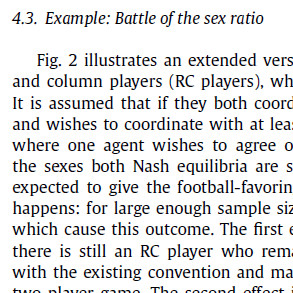This paper takes the idea of coalitional behavior – groups of people occasionally acting together to their mutual benefit – and incorporates it into the framework of evolutionary game theory that underpins the social learning literature. An equilibrium selection criterion is defined which we call coalitional stochastic stability (CSS). This differs from existing work on stochastic stability in that profitable coalitional deviations are given greater importance than unprofitable single player deviations. A general characterization of CSS is given together with more detailed characterizations for specific classes of games. Applications
include contracting, asymmetric social norms and collusive price setting, the latter of which is shown in some circumstances to facilitate competitive outcomes.
Published in Games and Economic Behavior (2012). Link to paper.
